Welcome to our article on reinforced retaining walls! At our company, we know how important it is to have a structurally sound and durable space. Reinforced retaining walls are a key component in achieving lasting strength for your property, be it residential or commercial. These walls are designed to bear the weight of soil and water, ensuring the stability and safety of the entire area.
Our reinforced retaining walls are made from high-quality materials, ensuring longevity and minimal maintenance. They are designed to withstand the forces of nature, be they landslides, earthquakes, or other environmental hazards. With our walls, you can be confident in the lasting strength and structural integrity of your space, providing peace of mind for you and your loved ones.
Stay tuned for more information on how these walls can benefit your property, the installation process, and materials to consider.
Building Stronger, Safer Spaces with Reinforced Retaining Walls
At Retaining Wall Contractor, we understand the importance of building spaces that are not only visually appealing but structurally sound. This is where reinforced retaining walls come in, providing both the strength and safety necessary to create reliable and durable structures.

Creating Stronger Spaces
The primary function of reinforced retaining walls is to create stronger spaces that can withstand the pressures of soil and water. By providing additional support to the soil, these walls can prevent erosion and potential property damage. At the same time, they help protect against landslides and other environmental hazards that can threaten the stability of your property.
Our reinforced retaining walls are designed and built to handle even the toughest conditions, ensuring that your property remains structurally sound for years to come. With our expertise, you can feel confident that your project will be completed with the utmost care and attention to detail.
Creating Safer Spaces
Reinforced retaining walls also provide an additional layer of safety for your property. By preventing erosion and potential landslides, these walls help protect your property and the people who live or work there. This can be especially important in areas prone to harsh weather conditions or natural disasters.
At Retaining Wall Contractor, we take the safety of your property seriously. That’s why we use only the highest quality materials and employ the most experienced professionals to ensure that your reinforced retaining walls are built to stand the test of time.
By choosing us as your partner in building your reinforced retaining walls, you can be sure that every step of the process will be handled with care and precision. From site evaluation and design to excavation and construction, we are committed to creating spaces that are both beautiful and structurally sound.
At Retaining Wall Contractor, we know what it takes to create spaces that are both strong and safe. Contact us today to learn more about how our reinforced retaining walls can help you create the perfect space for your property.
The Process of Installing Reinforced Retaining Walls
At Retaining Wall Contractor, we understand that the installation process of reinforced retaining walls is just as important as the materials used. Our team of professional contractors has years of experience in constructing these walls, ensuring that they are not only durable but also aesthetically pleasing.
The first step in the installation process is site evaluation. This involves assessing the terrain, soil type, and water drainage of the area where the wall will be installed. This information will be used to design a retaining wall that is tailored to the specific needs of your property.

Construction Process
Once the site evaluation and design are complete, the next step is excavation. This involves digging a trench where the wall will be placed. The trench must be deep enough to support the height of the wall and provide a solid foundation.
Next, the retaining wall material is placed in the trench. Depending on the material chosen, this may involve additional steps such as adding drainage pipes or reinforcing bars to ensure the structural integrity of the wall.
Professional Contractors
It is essential to hire professional contractors for the installation of reinforced retaining walls. At Retaining Wall Contractor, our team has the expertise and knowledge to ensure that your retaining wall is installed properly and will last for years to come. We follow all safety regulations and use the latest equipment and techniques to complete the installation process efficiently and effectively.
Overall, the installation process of reinforced retaining walls requires careful planning and execution. Our team of professionals at Retaining Wall Contractor has the experience and expertise to ensure that your retaining wall is installed properly, providing lasting stability and safety for your property.
Choosing the Right Materials for Reinforced Retaining Walls
When it comes to constructing reinforced retaining walls, selecting the right materials is crucial to ensure durability, sustainability and, of course, aesthetic appeal. At Retaining Wall Contractor, we have years of experience in working with a variety of materials, and we can help you choose the perfect fit for your needs.
Durability is Key
One of the most important factors to consider when choosing materials for reinforced retaining walls is durability. We want your walls to last as long as possible, withstanding the test of time, as well as any harsh environmental conditions. That’s why we often recommend concrete or stone as materials that have proven to be highly durable and long-lasting.
Considering Aesthetics
While durability is an important factor, we also understand the importance of aesthetics when it comes to constructing reinforced retaining walls. The walls you put up should blend in with the surrounding environment and enhance the overall look of your property. That’s why we often recommend using natural materials such as timber or stone. These materials can add a touch of warmth and texture to your space while ensuring that your walls are both functional and visually appealing.
Choosing the right materials for your reinforced retaining walls can be a daunting task, but we are here to help. Our team of experts works closely with you to ensure that you are satisfied with the final product, taking into account all your preferences, needs and budget.
FAQ
What are reinforced retaining walls?
Reinforced retaining walls are structures that are designed to hold back soil and prevent erosion. They are constructed using materials that provide additional strength and stability, such as concrete, timber, or stone.
Why are reinforced retaining walls important for structural integrity?
Reinforced retaining walls help ensure the structural integrity of a space by providing stability and preventing soil movement. They can withstand the pressure exerted by soil and water, preventing erosion and potential damage to the surrounding area.
How do reinforced retaining walls create stronger and safer spaces?
Reinforced retaining walls help create stronger and safer spaces by preventing soil movement and potential landslides. They provide stability and protect against erosion, ensuring the safety of your property and those who inhabit it.
What is the process of installing reinforced retaining walls?
The process of installing reinforced retaining walls involves several steps, starting with site evaluation and design. This is followed by excavation, construction, and proper installation by professional contractors. It is important to hire experienced professionals to ensure the long-term durability of the walls.
How do I choose the right materials for reinforced retaining walls?
When choosing materials for reinforced retaining walls, consider factors such as durability, sustainability, and aesthetic appeal. Materials such as concrete, timber, or stone can be used, each with their own advantages. Our expertise can help you select the materials that best suit your project’s needs.

